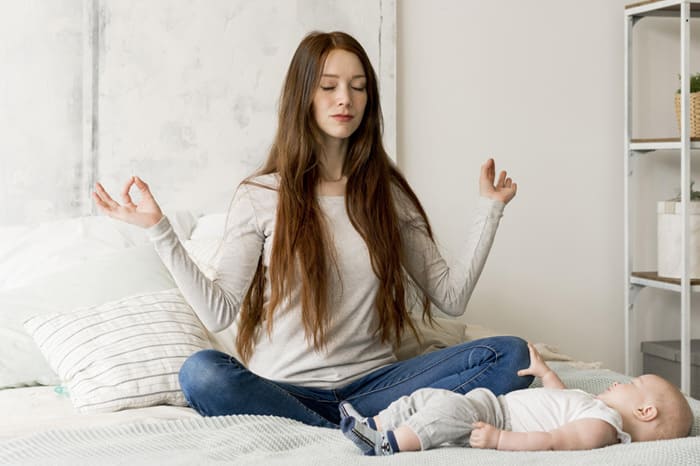Table of Contents
Bringing a baby into the world is often described as one of life’s most joyous experiences. Yet, many new mothers find themselves facing a wave of worry, racing thoughts, and sleepless nights that go beyond the usual adjustments of early parenthood. These struggles can make bonding with your baby and caring for yourself feel overwhelming.
Understanding postpartum anxiety is the first step to regaining peace of mind. It’s more common than many realize, and with the right guidance, mothers can learn effective ways to manage it. At Bloom Psychotherapy, we believe that awareness, practical tools, and supportive care can help mothers move through this stage easily.
Why Understanding Matters
Many women expect postpartum depression, but are less aware of the anxiety that often follows childbirth. Unlike general worry, symptoms may include racing thoughts, panic, and fears about your baby’s health or safety. These feelings can disrupt sleep, appetite, and even the ability to enjoy time with your newborn.
Recognizing these experiences as a legitimate condition rather than just “normal new mom stress” opens the door to getting real support. Bloom Psychotherapy encourages mothers to view these symptoms as signals that help is needed, not signs of weakness.
Common Signs of Postpartum Anxiety
Spotting the signs of postpartum anxiety early makes management easier. Some of the most frequent indicators include:
Constantly worry about the baby’s safety
Feeling restless or unable to relax
Physical symptoms like rapid heartbeat, dizziness, or shortness of breath
Trouble sleeping even when the baby is resting
Racing thoughts or intrusive fears
If these experiences feel familiar, you are not alone. Recognizing them is an important step toward recovery.
How Long Does Postpartum Anxiety Last?
One of the most frequent questions mothers ask is: How long does postpartum anxiety last? Unfortunately, there is no universal timeline. For some, symptoms fade within a few weeks as routines get back to normal. For others, anxiety can linger for months or even longer if left unaddressed.
The encouraging news is that with proper care, such as therapy, lifestyle adjustments, and social support, most mothers see significant improvement. Resources like Why Virtual Therapy is a Game-Changer for New Parents highlight how accessible help has become.
10 Practical Tips to Manage Postpartum Anxiety
Managing postpartum anxiety is not about eliminating worry but learning strategies to reduce its impact on your day-to-day life. Here are ten practical approaches that Bloom Psychotherapy often recommends:
Practice Deep Breathing: Slow, steady breaths calm the nervous system and ease physical symptoms of anxiety.
Limit Information Overload: Constant internet searching about baby health can worsen fears. Choose one or two reliable sources.
Stay Physically Active: Gentle activities like walking or yoga can release tension and improve mood.
Create a Rest Routine: Even short naps or scheduled quiet moments help restore energy and mental balance.
Write Down Your Thoughts: Journaling can slow racing thoughts and provide perspective.
Use Grounding Techniques: Focus on what you see, hear, and feel in the present to counter spiralling worries.
Lean on Trusted People: Talking openly with a partner, friend, or family member reduces feelings of isolation.
Seek Professional Help: A therapist can teach coping tools tailored to your needs. Bloom Psychotherapy specializes in supporting new mothers.
Practice Self-Compassion: Remember that recovery takes time, and you are doing your best.
Plan Short Breaks: Allowing yourself personal time, even just a few minutes, strengthens resilience.
The Role of Therapy and Support Systems
Although self-care practices can be helpful, systematic support can be a game-changer. Therapy offers a secure environment where fears can be addressed, coping mechanisms can be acquired, and confidence can be restored. New mothers would also find it easier to get assistance from the comfort of their homes through virtual sessions.
Family and community support are equally important. Honest conversations about parenthood, rest opportunities, and encouragement can ease the daily challenges. For couples considering starting or expanding their families. Resources like Should We Have a Baby? Highlight the importance of emotional readiness.
Conclusion
Postpartum anxiety can feel overwhelming, but it does not define you as a mother. By recognizing the signs of postpartum anxiety, understanding postpartum anxiety symptoms, and learning effective strategies, you can begin to heal. While the question of how long postpartum anxiety lasts varies for everyone, the right combination of self-care, therapy, and support ensures that recovery is possible.
Bloom Psychotherapy is dedicated to guiding mothers through this journey, offering tools, compassion, and expertise to help you reclaim your peace of mind and embrace this new chapter with strength.
FAQs
What are the common symptoms of postpartum anxiety?
The symptoms are constant worry, restlessness, racing thoughts, sleep problems, and physical symptoms such as an increased heart rate.
What is the duration of postpartum anxiety?
It varies. There are mothers who see improvement within weeks, and others require long-term assistance. Recovery can be achieved through treatment and therapy.
Is it possible to treat postpartum anxiety without medication?
Yes. Therapy, mindfulness, exercise, and social support can be helpful to many mothers. Treatment can be considered when the symptoms are acute or chronic.

.png)


